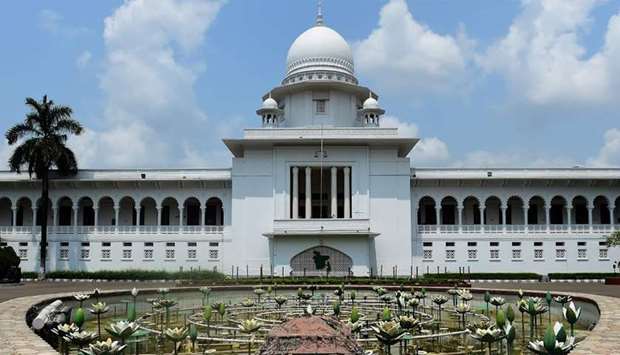Bangladesh's Supreme Court has scrapped parliament's power to sack top judges, in a landmark verdict that lawyers said Wednesday bolstered the independence of the country's judiciary.
The country's top court restored a military rule-era provision which allows only a Supreme Judicial Council, led by the chief justice, to remove judges found to have breached the judicial code of conduct.
The full ruling released Tuesday was quickly hailed by lawyers as a crucial safeguard for the freedom of the Muslim-majority nation's secular judiciary.
‘The judgement declares the 16th amendment of the constitution as null and void. It means the highest court scraps the parliament's power to remove top judges,’ senior lawyer Syed Ahsanul Karim told AFP.
Karim said that because of the ‘landmark’ judgement, the executive ‘will have no dominant role over the judiciary’.
Karim said if the amendment had been left in place, it would have made top judges ‘subservient’ to the government as they would have been under constant threat of removal.
Prime Minister Sheikh Hasina brought the constitutional change allowing parliament -- controlled by her ruling Awami League party -- to remove top judges in September 2014.
In May last year, the High Court declared the amendment illegitimate after a lawyer filed a public interest challenge.
The Supreme Court led by chief justice S.K. Sinha gave a provisional verdict last month ruling against the government.
‘The 16th amendment has raised doubts about the independence of the judiciary and the court boldly struck down that amendment,’ said Shahdeen Malik, senior lawyer and law professor.
‘This indicates the assertiveness of the court to preserve and protect its independence,’ he said.
The Supreme Court has increased pressure on the government to frame a code of conduct for lower court judges, who experts say are heavily influenced by the government.
Experts say a formal code would curb the government's power to use lower courts to prosecute opposition leaders and activists on trumped-up charges.
The law ministry has drafted rules, but the top court has rejected them.
Since coming to power in 2009, Hasina's government has detained and charged tens of thousands of opposition supporters.
Khaleda Zia, former prime minister and leader of the opposition, faces at least 30 charges.
Bangladesh was under military rule from 1975 to 1990.

